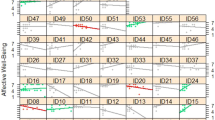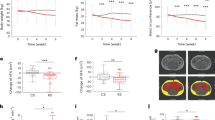Abstract
Objective:
To examine weight loss maintenance among previous participants of a university-based behavioral weight management program and to compare behavioral strategies and perceived barriers between successful and unsuccessful maintainers.
Method:
Previous program participants (n=179) completed mailed surveys assessing current weight, weight control behaviors and perceived barriers to weight loss maintenance.
Results:
At 14.1±10.8 months following completion of treatment, survey respondents were on average 12.6±12.6 kg, or 11.3±10.7%, below baseline weight; 76.5% of respondents had successfully maintained weight, defined as maintaining a weight loss of at least 5% below baseline. Compared to unsuccessful maintainers, successful maintainers reported practicing four dietary and three physical activity weight control strategies more often and experiencing five barriers to healthy eating and exercise less often. After accounting for time since treatment and maximum weight loss while in treatment, the strongest correlates of successful weight loss maintenance were frequent exercise and perceived difficulty of weight management.
Conclusions:
Clinically meaningful weight loss maintenance was achieved by the majority of participants. Findings support the literature indicating that physical activity is one of the strongest predictors of successful weight loss maintenance. Findings also suggest that strategies to reduce the level of perceived effort required for long-term weight control may improve maintenance outcomes.
This is a preview of subscription content, access via your institution
Access options
Subscribe to this journal
Receive 12 print issues and online access
$259.00 per year
only $21.58 per issue
Buy this article
- Purchase on Springer Link
- Instant access to full article PDF
Prices may be subject to local taxes which are calculated during checkout
Similar content being viewed by others
References
Stunkard A, Mc L-HM . The results of treatment for obesity: a review of the literature and report of a series. AMA Arch Intern Med 1959; 103: 79–85.
Kramer FM, Jeffery RW, Forster JL, Snell MK . Long-term follow-up of behavioral treatment for obesity: patterns of weight regain among men and women. Int J Obes 1989; 13: 123–136.
Stern JS, Hirsch J, Blair SN, Foreyt JP, Frank A, Kumanyika SK et al. Weighing the options: criteria for evaluating weight-management programs. The committee to develop criteria for evaluating the outcomes of approaches to prevent and treat obesity. Obes Res 1995; 3: 591–604.
Douketis JD, Feightner JW, Attia J, Feldman WF . Review: most obesity treatment methods are ineffective over the long term. ACP J Club 1999; July/Aug: 20.
Crawford D, Jeffery RW, French SA . Can anyone successfully control their weight? Findings of a three year community-based study of men and women. Int J Obes Relat Metab Disord 2000; 24: 1107–1110.
Blackburn G . Effect of degree of weight loss on health benefits. Obes Res 1995; 3 (Suppl 2): 211s–216s.
Goldstein DJ . Beneficial health effects of modest weight loss. Int J Obes Relat Metab Disord 1992; 16: 397–415.
Expert panel on the identification, evaluation, and treatment of overweight in adults. Clinical guidelines on the identification, evaluation, treatment of overweight and obesity in adults: executive summary. Am J Clin Nutr 1998; 68: 899–917.
Wing RR, Phelan S . Long-term weight loss maintenance. Am J Clin Nutr 2005; 82 (1 Suppl): 222S–225S.
Wing RR, Hill JO . Successful weight loss maintenance. Annu Rev Nutr 2001; 21: 323–341.
Phelan S, Hill JO, Lang W, Dibello JR, Wing RR . Recovery from relapse among successful weight maintainers. Am J Clin Nutr 2003; 78: 1079–1084.
Lowe MR, Miller-Kovach K, Phelan S . Weight-loss maintenance in overweight individuals one to five years following successful completion of a commercial weight loss program. Int J Obes Relat Metab Disord 2001; 25: 325–331.
Wadden TA, Frey DL . A multicenter evaluation of a proprietary weight loss program for the treatment of marked obesity: a five-year follow-up. Int J Eat Disord 1997; 22: 203–212.
Gosselin C, Cote G . Weight loss maintenance in women two to eleven years after participating in a commercial program: a survey. BMC Womens Health 2001; 1: 2.
Cramer JA . A systematic review of adherence with medications for diabetes. Diabetes Care 2004; 27: 1218–1224.
Osterberg L, Blaschke T . Adherence to medication. N Engl J Med 2005; 353: 487–497.
Brownell KD . Whether obesity should be treated. Health Psychol 1993; 12: 339–341.
LeCheminant JD, Jacobsen DJ, Hall MA, Donnelly JE . A comparison of meal replacements and medication in weight maintenance after weight loss. J Am Coll Nutr 2005; 24: 347–353.
McGuire MT, Wing RR, Klem ML, Lang W, Hill JO . What predicts weight regain in a group of successful weight losers? J Consult Clin Psychol 1999; 67: 177–185.
Stunkard AJ, Albaum JM . The accuracy of self-reported weights. Am J Clin Nutr 1981; 34: 1593–1599.
Wadden TA, Berkowitz RI, Sarwer DB, Prus-Wisniewski R, Steinberg C . Benefits of lifestyle modification in the pharmacologic treatment of obesity: a randomized trial. Arch Intern Med 2001; 161: 218–227.
Wadden TA, Berkowitz RI, Womble LG, Sarwer DB, Phelan S, Cato RK et al. Randomized trial of lifestyle modification and pharmacotherapy for obesity. N Engl J Med 2005; 353: 2111–2120.
Wing RR, Tate DF, Gorin AA, Raynor HA, Fava JL . A self-regulation program for maintenance of weight loss. N Engl J Med 2006; 355: 1563–1571.
Stevens J, Truesdale KP, McClain JE, Cai J . The definition of weight maintenance. Int J Obes (London) 2006; 30: 391–399.
Wadden TA, Sternberg JA, Letizia KA, Stunkard AJ, Foster GD . Treatment of obesity by very low calorie diet, behavior therapy, and their combination: a five-year perspective. Int J Obes 1989; 13 (Suppl 2): 39–46.
Perri MG, McAllister DA, Gange JJ, Jordan RC, McAdoo G, Nezu AM . Effects of four maintenance programs on the long-term management of obesity. J Consult Clin Psychol 1988; 56: 529–534.
Perri MG, Nezu AM, Patti ET, McCann KL . Effect of length of treatment on weight loss. J Consult Clin Psychol 1989; 57: 450–452.
Perri MG, Nezu AM, McKelvey WF, Shermer RL, Renjilian DA, Viegener BJ . Relapse prevention training and problem-solving therapy in the long-term management of obesity. J Consult Clin Psychol 2001; 69: 722–726.
Heymsfield SB, van Mierlo CA, van der Knaap HC, Heo M, Frier HI . Weight management using a meal replacement strategy: meta and pooling analysis from six studies. Int J Obes Relat Metab Disord 2003; 27: 537–549.
Ditschuneit HH, Flechtner-Mors M . Value of structured meals for weight management: risk factors and long-term weight maintenance. Obes Res 2001; 9 (Suppl 4): 284S–289S.
Jeffery RW, Wing RR, Sherwood NE, Tate DF . Physical activity and weight loss: does prescribing higher physical activity goals improve outcome? Am J Clin Nutr 2003; 78: 684–689.
Jakicic JM, Marcus BH, Gallagher KI, Napolitano M, Lang W . Effect of exercise duration and intensity on weight loss in overweight, sedentary women: a randomized trial. JAMA 2003; 290: 1323–1330.
Epstein LH, Saelens BE . Behavioral economics of obesity: food intake and energy expenditure.In: Bickel WK, Vuchinich RE (eds). Reframing Health Behavior Change with Behavioral Economics. Lawrence Erlbaum: Mahwah, NJ, 1999,pp 293–311.
Klem ML, Wing RR, Lang W, McGuire MT, Hill JO . Does weight loss maintenance become easier over time? Obes Res 2000; 8: 438–444.
Marlatt GA, George WH . Relapse prevention and the maintenance of optimal health.In: Shumaker SA, Schron EB, Ockene JK, McBee WL (eds). The Handbook of Health Behavior Change,2nd edn. Springer: New York, 1998,pp 33–58.
Dohm FA, Beattie JA, Aibel C, Striegel-Moore RH . Factors differentiating women and men who successfully maintain weight loss from women and men who do not. J Clin Psychol 2001; 57: 105–117.
Tell GS, Jeffery RW, Kramer FM, Snell MK . Can self-reported body weight be used to evaluate long-term follow-up of a weight-loss program? J Am Diet Assoc 1987; 87: 1198–1201.
Nyholm M, Gullberg B, Merlo J, Lundqvist-Persson C, Rastam L, Lindblad U . The validity of obesity based on self-reported weight and height: implications for population studies. Obesity (Silver Spring) 2007; 15: 197–208.
Dillman DA . The design and administration of mailed surveys. Annu Rev Sociol 1991; 17: 225–249.
Greene LF, Malpede CZ, Henson CS, Hubbert KA, Heimburger DC, Ard JD . Weight maintenance 2 years after participation in a weight loss program promoting low-energy density foods. Obesity (Silver Spring) 2006; 14: 1795–1801.
Rothert K, Strecher VJ, Doyle LA, Caplan WM, Joyce JS, Jimison HB et al. Web-based weight management programs in an integrated health care setting: a randomized, controlled trial. Obesity (Silver Spring) 2006; 14: 266–272.
Author information
Authors and Affiliations
Corresponding author
Rights and permissions
About this article
Cite this article
Befort, C., Stewart, E., Smith, B. et al. Weight maintenance, behaviors and barriers among previous participants of a university-based weight control program. Int J Obes 32, 519–526 (2008). https://doi.org/10.1038/sj.ijo.0803769
Received:
Revised:
Accepted:
Published:
Issue Date:
DOI: https://doi.org/10.1038/sj.ijo.0803769
Keywords
This article is cited by
-
Integrating Pharmacotherapy and Psychotherapy for Weight Loss
Journal of Health Service Psychology (2023)
-
Weight-related behaviors and weight loss maintenance: a cross-sectional study in Cyprus
BMC Public Health (2021)
-
Novel behavioral interventions to improve long-term weight loss: A randomized trial of acceptance and commitment therapy or self-regulation for weight loss maintenance
Journal of Behavioral Medicine (2021)
-
The Most Undertreated Chronic Disease: Addressing Obesity in Primary Care Settings
Current Obesity Reports (2021)
-
Exploration of Finnish adults’ successful weight management over the life course: a qualitative study
BMC Public Health (2020)



